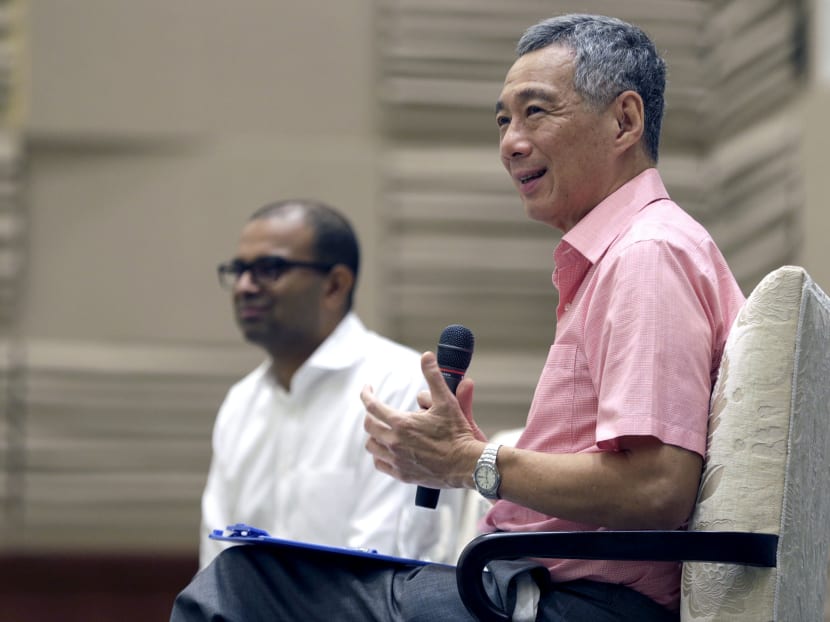Complacent and dangerous if racial, religious harmony taken for granted: PM
SINGAPORE — Not only did racial and religious harmony in the Republic not come about naturally, but such issues are even “more complicated and more difficult” than when Singapore became independent, Prime Minister Lee Hsien Loong said today (Oct 4).

Prime Minister Lee Hsien Loong at the Community Leaders’ Conference at The Grassroots Club on Oct 4, 2015. Photo: Wee Teck Hian
SINGAPORE — Not only did racial and religious harmony in the Republic not come about naturally, but such issues are even “more complicated and more difficult” than when Singapore became independent, Prime Minister Lee Hsien Loong said today (Oct 4).
Challenges in the form of “incidents with a racial tinge” loom large — be they in real life or on social media. And the threat of jihadist terrorism is never far, he warned at a conference for about 450 community and religious leaders at The Grassroots Club.
“We’ve made a lot of progress over these 50 years. But we made so much progress that sometimes Singaporeans may be lulled into thinking that we have arrived ... and race and religion can no longer divide our society,” said Mr Lee. “I think that’s being complacent. That’s dangerous ... It’s very unwise to assume that we don’t have to be careful.”
He added that in any society, race and religion will remain difficult, sensitive topics and a work-in-progress. The state of affairs in Singapore stemmed from “an act of will which we have sustained over many decades”, but from time to time, issues surface online.
“You just look at what happens when we don’t manage to keep things under control. One person puts a rude post on his Facebook page, goes to sleep and the next morning, half of Singapore is angry with him. Sometimes, angry with her,” said Mr Lee.
In 2012, the National Trades Union Congress sacked its assistant director Amy Cheong for writing insensitive comments on Malay weddings on her Facebook page. Her post went viral and drew the ire of netizens.
Tensions could also simmer offline, in the case of inter-religious marriages or family members converting from one faith to another.
On religious rites for births or deaths in the family, Mr Lee said: “Whose rights do you follow? ... It’s very sensitive. Emotions are up. Everybody is already upset, and something like this comes along, it can easily become a problem.”
Overseas developments could also have consequences on the racial and religious harmony here.
Citing Jihadist terrorism and the Islamic State in Iraq and Syria (ISIS) as an example, Mr Lee reminded his audience that the threat is not only in the Middle East.
Globally, some 30,000 individuals have travelled to the Middle East to join ISIS. Public data showed that 500 to 600 Indonesians and dozens of Malaysians have done so.
To date, nine self-radicalised Singaporeans have been detained. Some had planned to fight in the Middle East, while one wanted to assassinate the Republic’s President and the Prime Minister.
Just last month, an 18-year-old and a 29-year-old were detained under the Internal Security Act for intending to travel to Syria to join ISIS.
“So we’ve got to be on our guard. If (terrorism) comes to Singapore, we must be very, very careful that we don’t let it pull our fabric apart,” said Mr Lee.
Racial ties must be nurtured and built upon, he urged, through advocacy groups such as OnePeople.sg and inter-faith platforms such as the Inter-Racial and Religious Confidence Circles in every constituency.
A 2013 Institute of Policy Studies and OnePeople.sg survey found that while all respondents believed in racial and religious harmony, fewer than half had at least one close friend of another race.
“For many people, the friendships are still within the family or still within their own groups. So I think we have to continue to work on it and to do better,” said Mr Lee.
Recounting the racial riots in the 1960s, Mr Lee said older Singaporeans who lived through these would know not to take harmony for granted. But for the younger generation, there must be constant reminders of how “rare” this harmony is.
Several years ago, Mr Lee visited a school exhibition on racial harmony. A pupil asked him if he had celebrated Racial Harmony Day during his schooling days.
“I was so taken aback. I said, ‘No, I didn’t celebrate Racial Harmony Day. On July 21, when I was in school, one day there was a riot. That’s why you’re celebrating (the day) now’,” recounted Mr Lee, choking up slightly.
Composing himself, he continued: “I think he understood me, but in a way, he was not there. You don’t want that generation ever to be there. And yet, you want the generation to understand.”






